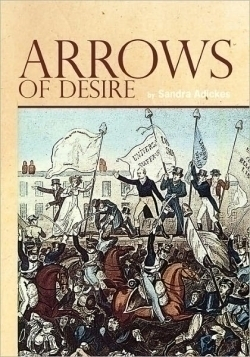Arrows of Desire
Arrows of Desire is a provocative title with a pedigreed history. The noun phrase is in William Blake’s epic, Milton a Poem. Since then, part of Blake’s preface to the poem has become Jerusalem, an unofficial anthem that rejoices in a heaven in England prior to the development of the satanic mills of the Industrial Revolution. Sandra Adickes, professor emerita in the English department at Winona State University in Minnesota, writes a historical fiction worthy of its title. The author skillfully uses scores of allusions to the great works of literature, politics, social discourse, and other arts from the period of the Industrial Revolution. She also includes The Pilgrim’s Progress, the most famous allegory in English Literature. Arrows of Desire, spanning four decades from 1794 to 1832, is similarly presented—a story designed to give reference to historical events.
After fighting against the Americans in their revolution, Englishman Joshua Benton becomes an admirer of Tom Paine and feels remorse at having killed farmers like himself during the war. When a huge cotton mill is built in his hamlet, most of his friends lose their jobs to machinery or end up working inhuman hours at the mill and living in the company’s tenements. He unifies the workers, and his wife, Hannah, sets up a school for the poor. When the couple’s children become adults, each in his or her own way espouses the alleviation of suffering and seeks remedies to right social wrongs.
The book’s chapters are laid out in time frames with simple titles explaining the Benton family’s life purpose—to build a new Jerusalem by seeking reform. The text is well wrought, its logical construction akin to that of Jane Austen’s work, which also appeared in this time period. The Benton women enjoy Austen’s elegant prose and her characters, who represent the south of England at a time when females sought security and love. However, the Benton women are social advocates with political agendas; they want “…a novel about the struggles for actual survival…[one] that exposes injustice and corruption.” Adickes’s book specifies how the family works to alleviate mistreatment of the poor and working class who are exploited or abandoned when machines take over.
Manchester becomes the center of the factories and mills that bring wealth to some, but destroy the environment while committing millions to lives of poverty. The church is complicit as it aids the mill owners. Manchester is the prominent setting for the Bentons, who feel they have been cast out of Eden, and the city where reform and a representative government is most needed.
Adickes engages the reader with history through the speeches of her characters. She adroitly uses political treatises, poetry, and novels that illuminate the zeitgeist, from Rights of Man by Paine and The Prelude by William Wordsworth to the great writings of Percy Bysshe Shelley and Lord Byron. Her fantastic book serves historians as a reference and lovers of literature with a treasured work of art.
Reviewed by
Mary Popham
Disclosure: This article is not an endorsement, but a review. The publisher of this book provided free copies of the book and paid a small fee to have their book reviewed by a professional reviewer. Foreword Reviews and Clarion Reviews make no guarantee that the publisher will receive a positive review. Foreword Magazine, Inc. is disclosing this in accordance with the Federal Trade Commission’s 16 CFR, Part 255.

